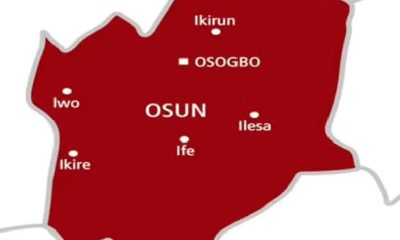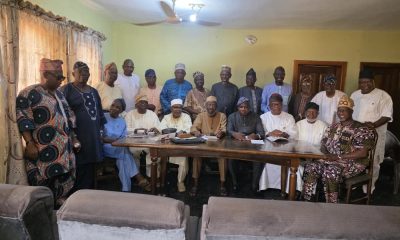Economy
Tax Treaties: Time for Africans to End Revenue Linkages

By Dimeji Macaulay
Preamble
As a tax justice campaigner, I feel compelled to put a clarion call on youth, workers’ movements, civil societies, community members and trade union leaders, to mobilize and advocate against anomalies in tax treaties and tax holidays which only benefit multinational corporations in Nigeria and parts of Africa; and by so doing, we all rise up to collectively fight to end revenue linkages.
One of the leading African political writers, Walter Rodney, in his book: “How Europe Under-developed Africa”, examined how our continent have been shortchanged and placed on permanent starvation for decades of colonization and after decolonization by the imperialist world powers.
With this backdrop, I arose from the training sessions held by both ActionAid Nigeria and African Submit on Tax Treaties between February 22nd and 23rd cum 24th and 25th, separately and in different settings, focusing on tax treaties, with a curiosity that fueled my angst.
Tax treaty and those involved
Without doubt, many an average reader would be conversant with the concept of Tax Treaties. But for the benefit of those who are not, tax treaties are agreements signed between governments of countries and often times with administrators of multinational companies to permit them come into a country and invest without paying tax. It also affords opportunities to indigenes of the country to go and establish in a representative country without paying tax. Given this, tax treaties can be referred to as Double Tax Agreements (DTAs), Double Tax Treaties (DTTs) or Double Taxation Conventions (DTC).
Unfortunately, however, the process and conducts African leaders deploy in contracting the treaties without due recourse to economic experts’ inputs have dealt what could have earned their respective countries huge economic gains, a huge blow. As such, whatever profits the treaties may score for respective countries are largely compromised.
For the benefit of convictions, tax treaties decide how much the contracting states can levy multinational companies and other cross-border activities. In the instance of Nigeria, a research reveals that we lose about five hundred billion in naira, an approximate of ($3.3billion), to tax treaties in the last five years because many of the multinational companies in the country denied their workers living wages. Consequently, the research says, many employees are placed on poverty wages despite being the wealth creators and operators of their respective multinationals sweatshops.
However, there is a good side to tax treaties which can only be utilized had respective governments, while adopting the agreements, insert a notification to local investors to also go to the same countries they signed treaties with, to set up businesses so that they can equally enjoy tax treaties. But by Nigeria and African standards, it is quite doubtful if our local investors or business owners have the financial muscles to enter other countries to institute industries.
To this extent, our governments have operated and endorsed tax treaties in ways that are beneficiary only to mostly foreign multinationals and respective regime’s agencies as the main actors excluded especially domestic business owners and other extended beneficiaries.
What they fail to admit and acknowledge is that many of the bilateral tax treaties govern what taxing rights developing countries have, but frequently reduce the rights of poorer countries to tax theses flows.
Africa: Making progress or need a new direction
According to economic facts, tax treaties for Africa’s developing countries is an attempt to drag us to second slavery. It is long established that huge amount lost to tax treaties and tax incentives usually make things worse for the continent because many of our governments signed this agreement with the mind set to woo investors without tangible modalities for developing Africans countries better than they met it.
Looking at Nigeria, none of the key sectors of the economy is working. Be it education, health, energy, power, security, transportation and human social protection programmes, all have been in a comatose inflicting on every average citizen bothersome conditions of life.
Reports say that in some other African countries, placed aside better developed European nations; for every 1,000 children born alive in Cameroon, 100 never lived to see their first birthday; and out of every 1,000 children born alive in rural Sierra-Leone, 160 die before reaching age one. Whereas, the comparable figures for the United Kingdom (UK) and Holland are only 12 and 18, respectively. Aside that, many more African children reportedly die before they reach the age of five. One of the acclaimed draw backs is lack of qualified doctors to stem the tide.
In Italy however, there is a doctor for every 580 Italians while in Czechoslovakia, there is one doctor for every 510 citizens. Closer to Nigeria in Niger republic, one doctor must be for 56,140 people. In Tunisia, it is one doctor for every 8,320 Tunisians; and also in Chad, they have one doctor for every 73,460 Chadians.
Nigeria, as we learn, losses huge sum of five hundred and thirty-eight billion (N538billon) to tax incentives, which, if well utilized, can be used to build new or re-build old refineries that will totally wipe out or reduce importation of petrol. If done, this will as well, end the citizens’ age long suffering amidst abundance.
In the same vein, despite the United Nations’ Scientific and Cultural Organization (UNESCO) recommended 26percent budgetary allocation for education in developing African countries; our own nation, Nigeria’s allocation within the last decade has never been up to 10percent. And an average concerned Nigerian wants to wonder why and where is the 16percent cut off and what is it being used for or into what is it diverted.
While these ponderings linger on, it will not be out of place to assert that, now than ever before, our continent, Africa, rich in all aspects of life, needs a new direction.
We need leaders with a sense of purpose, that will, whenever tax treaties are being signed, involve experts on taxation matters that will advise and urge indigenous business owners, duly registered with their country’s regulatory agency, in the case of Nigeria, the Corporate Affairs Commission (CAC), guiding them to use local bank accounts to operate. Also, they will ensure that period of tax holiday be reduced from five to three years and as well show why many investors do not need to be given moratorium, among others.
As things stand today, many local companies are subjected to tax payments despite the obvious fact that our government do not transact businesses with them. Several of them are without Tax Identification Number (TIN), tax clearance and other necessities amidst the whimsies of multinationals getting away with huge profits without recourse. These revenue leakages must be stopped.
Public debt amidst abundance and tax splashes
According to tradingeconomics.com, Nigeria recorded a government debt equivalent to 11.50 percent of the country’s Gross Domestic Product in 2015. This government debt converted to GDP averaged 30.93percent from 2000 to 2015. It is said to reach an all-time high of 88.00percent in 2001 and a record low of 9.60percent in 2009. Yet, Nigeria’s external debt remained unchanged at $11261.89million in the third quarter of 2016 from $11261.89million in the second quarter of 2016. The reports indicated that Nigeria’s external debt averaged $6792.26million from 2008 until 2016, hitting an all-time high of $11261.89million in the second quarter of 2016 and a record low of $3627.50million in the first quarter of 2009.
Nigeria’s total public debt stock, the tradingeconomics.com says, stands at N12.2trilion ($63.8billion) as of June 30th, 2015. About $10.3billion of this quoted amount, analysis noted, comprised of external debt. These figures, they further argued, represent our country’s highest debt profile since 2007. The deductions are that, these growths in the volume of debt resulted from massive borrowing from both domestic and external sources by the states and federal government as data obtained via the debt Management Office (DMO) reveals. These loopholes, however, can be curbed and blocked if the tax revenue leakages are quickly corrected and ended.
The above figures, made available via different channels on the Public Debt in Nigeria, reveal the need for actions to let the will of the people be decided on issues of tax treaties. While Nigeria is giving away huge tax holidays to multinationals companies; it is instructive to let people know that taxes do not produce national wealth and development. It is, however, an important means by which developing countries in Africa with high public and international debts and poor infrastructures and social amenities, could solve part of her social problems.
Need for urgent united action
Interestingly, there have been remonstrations in parts of Africa on issues of tax treaties. In 2016, some members of ACTIVISTA organize series of stunts around tax justice to the National Assembly. The central labour leaders also organized a protest demo to ministry of finance on tax justices.
Also in Abuja, tax treaties training was organized by ActionAid Nigeria on 22nd and 23rd of February, while that of the African Summit on Tax Treaties held from 24th to 25th of February 2017. The two events hosted participants from different countries, Federal Inland Revenue Services (FIRS) and unions with a few government representatives in attendance. Conclusively, all these actions that can be dubbed a pull of momentum to reshape the future of a continent and nation hitherto laden with sorrow and tears.
Recalling one of the late Afro beat musician, Fela Anikulapo’s radical rhythms back in the early 1980s “International Thief-Thief (ITT), in which he used the song to expose the inter-continental and international thieveries cross-exchanging among the governments and multinationals that used to come to exploit Africa’s rich resources; it is pertinent to assert that, sadly years after his demise, the same trend continues till date.
And this makes the heart heavy as one continues to wonder why Africans are so subjected to untold sufferings amidst abundance whereas multinational entities return to their countries with huge profits, earned through back door transactions, in the name of tax holidays.
At this point, fellow Africans, let us assert to our leaders that we can no longer fold our arms and accept this injustice. Let us shout affirmatively that enough is enough! Just as a tree cannot make a forest; let us together rise up and defend the future of our continent. Now is the time to call guilt-ridden African leaders to stop the crime against her own people through tax treaties.
We need to enforce our existing movements in order to consolidate on the past gains and forge ahead with dedicated meetings, public awareness and press campaigns as well as utilize the use of community programmes to sensitize our people on the significance of tax treaties and tax power.
We use this medium to call on Trade Union Leaders in Africa to get ready to play leading roles in this fight to end revenue leakages.
Interestingly, a member of Nigeria’s National Assembly, Honorable Kehinde Odenenye, is already on the tax justices campaign train. After raising the motion at the Lower Chamber, he has also reached out to the ActionAid Nigeria to provide vital information to enlighten the Nigerian public.
His stance, like that of the many participants of the African summit on tax treaties, was that of a renewed hope in the struggle for tax justices in Africa to permanently put an end to tax leakages.
Dimeji Macaulay is the Northern Coordinator of Education Rights Campaign (ERC) and Member ACTIVISTA oladimejimacaulay@gmail.com 07032069383
-

 Opinion4 days ago
Opinion4 days agoThe Clout-chasing Dipo Awojide By Comrade Da’Peace
-

 News3 days ago
News3 days agoRamadan, Lent: Shettima Calls For National Unity And Compassion
-

 Opinion3 days ago
Opinion3 days agoReinventing Osun’s Economy Through Dagbolu Intl. Trade Centre: From Quiet Market Lessons To Regional Trade Revolution By Adeboye Adebayo
-

 News5 days ago
News5 days ago2026: Let’s Work Hand In Hand To Ensure Party’s Victory, APC Igbimo-Agba Osun Urges Ex-guber Aspirants, Party Members


